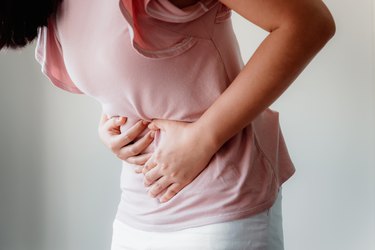
People who have gastritis — a condition that occurs when the lining of the stomach is inflamed or irritated — sometimes wonder if taking a popular heartburn drug like Nexium might ease their pain. The simple answer is "yes."
Nexium (esomeprazole) is considered to be relatively safe. However, it's important to understand what the medication actually does and the implications it has on body processes and nutrient absorption.
Video of the Day
Video of the Day
How Does Nexium Work?
"Esomeprazole is a proton pump inhibitor drug," explains Hardeep Singh, MD, a gastroenterologist at St. Joseph Hospital in Orange, California. "These medications shut off the major pathway in the stomach that creates acid." According to the U.S. National Library of Medicine, proton pump inhibitors (PPIs) are used to provide relief from acid reflux and to treat stomach ulcers and damage to the lower esophagus caused by acid reflux.
If there are foods that typically trigger acid reflux and other symptoms associated with gastritis, Nexium or another PPI medication might be an option. "While taking these types of drugs, people may be able to tolerate foods that they otherwise wouldn't be able to," Dr. Singh says.
Read more: Foods to Avoid for Gastritis
PPIs are available by prescription or over the counter, depending on the strength of the dose. Most PPI medications are in pill form, and some are available as a powder that's mixed with liquid.
Special Nutritional Considerations
Prolonged use of PPIs may lead to problems with the way the body absorbs certain nutrients from foods. PPIs work by inhibiting or preventing acid secretion in the stomach. This is beneficial for relieving symptoms associated with too much acid secretion.
However, research published in the Journal of Neurogastroenterology and Motility in April 2018 explains that the body needs some gastric acid to help absorb nutrients from foods, including iron, calcium and vitamin B12. And diarrhea, a common side effect of PPIs, can cause low magnesium levels because the mineral isn't being absorbed in the small intestine.
Nutrient-Dense Food Options
A nutrient-dense diet is important for people who take Nexium for gastritis. Make sure you're getting plenty of these nutrients for proper absorption:
Protein. Eating protein-rich foods can speed up healing of the stomach because high-protein foods help repair inflamed tissues. These foods include low-fat proteins such as skinned poultry, lean meat, beans, fish and low-fat dairy.
Iron. The body needs iron to grow and develop. It's an essential nutrient that's necessary for making hemoglobin, an important component of blood cells. The National Institutes of Health recommends including lean meats, chicken and seafood in meal plans to add a healthy dose of iron. Spinach, kidney beans, nuts and raisins are also good sources of iron.
Magnesium. This mineral is needed for more than 300 biochemical reactions in the body, according to the U.S. National Library of Medicine. Fruits, nuts, legumes, soy products, whole grains and milk are go-to sources.
Calcium. Bones, teeth, blood and muscle all need calcium to be healthy and function properly, explains the U.S. National Library of Medicine. Calcium-rich foods include such dairy products as milk, yogurt and cheese. Leafy green vegetables and fish with soft, edible bones, such as salmon and sardines, are also good options.
B12. Vitamin B12 assists in maintaining the central nervous system. It's also involved in the formation of red blood cells. Foods including meat, eggs, fortified breakfast cereals and dairy products are good sources of B12, according to the U.S. National Library of Medicine.
Read more: Are Probiotics Good for Gastritis?
Lack of adequate amounts of these important nutrients can cause a multitude of health issues. While not every person who takes Nexium will experience problems, the risks do exist. Talk with your doctor about dietary changes that may be best for you to ensure you're getting the nutrients you need while taking Nexium and for overall good health.
If necessary, your doctor may recommend specific dietary supplements to help reduce the risk of nutritional deficiencies from taking Nexium. However, the National Institute of Diabetes and Digestive and Kidney cautions against taking supplements without talking to your doctor first. In some instances, iron supplements can actually cause gastritis.
- Hardeep Singh, MD, gastroenterologist, St. Joseph Hospital, Orange, California
- Journal of Neurogastroenterology and Motility: “Advantages and Disadvantages of Long-term Proton Pump Inhibitor Use”
- U.S. National Library of Medicine: “Proton Pump Inhibitors”
- National Institute of Diabetes and Digestive and Kidney Diseases: “Eating, Diet, and Nutrition for Gastritis and Gastropathy”
- Office of Dietary Supplements, National Institutes of Health: “Iron”
- U.S. National Library of Medicine: “Magnesium in Diet”
- U.S. National Library of Medicine: “Calcium”
- U.S. National Library of Medicine. “Vitamin B12 deficiency anemia.”
Is this an emergency? If you are experiencing serious medical symptoms, please see the National Library of Medicine’s list of signs you need emergency medical attention or call 911.